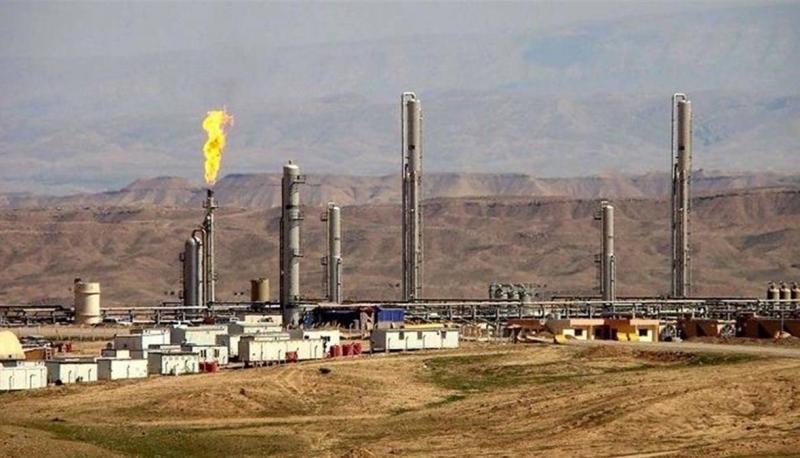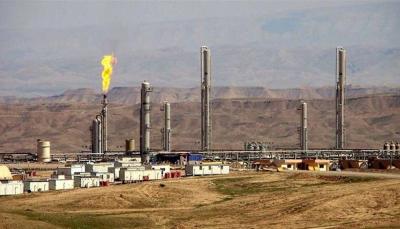Repeated attacks on the Kor Mor gas field have led energy and security experts, as well as officials, to conclude that there are "regional" motives to undermine the aspirations of the Kurdistan Region and Iraq to enter the global gas market. A drone attack on the Kor Mor gas field in the Kurdistan Region resulted in the death of four Yemeni workers and halted gas supplies to power stations, causing a decrease in production of about 2,500 megawatts. No group has claimed responsibility for the attacks, which have occurred for the second time this year and the eighth time in two years.
**What is the importance of the Kor Mor field?**
The Kor Mor gas field spans 135 square kilometers and is the largest producer of free gas in Iraq, with proven reserves of 8.2 trillion cubic feet. Its production reaches 452 million cubic feet of dry gas and 15,000 barrels of condensates, along with over 1,000 metric tons of liquefied petroleum gas daily. The field produces the gas necessary for generating 4,200 megawatts of electricity daily, of which 2,800 megawatts are sent to the Kurdistan Region and the remainder to the provinces of Kirkuk and Nineveh. This was confirmed by economist Nabil Al-Marsoumi, who added that the field transports natural gas via pipelines to the electricity generation stations in Jamjamal and Erbil, providing 67% of the electricity for the Kurdistan Region.
Regarding the entities investing in this field, Al-Marsoumi noted that foreign investors include Dana Gas and Al-Hilal, each holding a 35% stake, and 10% each for OMV, MOL, and RWE. He stated that the future outlook for the field was to increase the production level to 630 million standard cubic feet in 2023, but progress has been significantly delayed due to various reasons, mainly repeated bombings. This situation prompted the American company (Ekstran) to abandon operations at the field, which is partially funded through a $250 million agreement with the U.S. International Development Finance Corporation.
Dr. Khaled Haidar, an academic and economic expert, commented that "the targeting of this field undermines the Kurdistan Region's access to its gas needs, forcing it to import gas and electricity from neighboring countries, suggesting a regional impact or involvement from certain countries." He pointed out that the latest attack on the field resulted in the loss of 2,500 megawatts of electricity, clearly indicating its importance and impact.
Given the Kurdistan Region's plans to transport natural gas to Europe, it has gained significant international attention amid the increasing ramifications of the Russian-Ukrainian crisis on the energy sector in Europe. Thus, efforts have accelerated to establish a strategic plan for a pipeline that will primarily originate from the Kor Mor field, passing through Erbil and ending in Duhok, which would then connect to a Turkish pipeline network allowing transport to European Union countries.
Located in the Jamjamal district of Sulaymaniyah province, which is the main center for the Patriotic Union of Kurdistan, this area underwent administrative geographic changes, having previously been part of Kirkuk province during the 1970s. After 2003, the Kurdistan Regional Government gained control of the region, which is predominantly Kurdish. Following 2007, the Kurdistan Regional Government, led by Nechirvan Barzani at that time, successfully attracted several energy companies for natural gas extraction.
The Pearl Consortium, which includes the Emirati Dana Gas and its subsidiary Oil Al-Hilal, holds exploitation rights for Kor Mor and Jamjamal. Dana Gas claims that production jumped significantly by 50% between 2018 and 2021, reaching 452 million cubic feet, along with 15,000 barrels of condensates and over 1,000 metric tons of liquefied petroleum gas daily. The consortium has also laid out an ambitious plan for maintenance and expansion of the natural gas processing lines at the Kor Mor station to achieve a production level of 900 million cubic feet per day by 2023, marking a significant turning point that would add more value to this field.
Jabar Yawar, the former Secretary-General of the Ministry of Peshmerga, stated that the field has been targeted multiple times by various attacks from unknown entities, despite the formation of joint committees between the Baghdad and Erbil governments. It is clear that these groups oppose the interests of both the region and Baghdad and hinder regional stability.
**Political Targeting and Intelligence Failures**
Security expert Sarmad Al-Bayati believes that the lack of a radar system to detect aircraft has been a significant factor in targeting the field, noting that Iraq has agreed with the American side to provide six aircraft detection systems to potentially end the dominance of drones in these areas. He emphasizes that politics is intertwined with economics, particularly since agreements recently made by Iraq with Turkey and Qatar have upset certain parties, and the fact that the field produces gas that could be exported to Europe could negatively impact some countries in the region and beyond.
Overall, a long-standing dispute exists between Baghdad and Kurdistan regarding the oil and gas file, particularly after the recent Federal Court ruling nullifying oil and gas contracts signed by the Kurdistan Regional Government with foreign companies. In May 2022, the North Oil Company, part of the Iraqi oil ministry, accused Kurdish Peshmerga forces of controlling several fields, including the Kor Mor field. This dispute has been accompanied by an escalation in media campaigns led by some parties close to the Shiite "Coordination Framework," which has also seen a mobilization of the Turkmen public in Kirkuk.
A month after that dispute, the Kor Mor field was subjected to three missile attacks within a short span. Mahmoud Khushnaw, a political advisor to the Kurdistan Parliament, stated that "the armed groups targeting the field operate in areas of security vacuum between the regions controlled by the regional and federal governments, adjacent to disputed areas." He noted that the attack on the Kor Mor field originated from the southwestern part of the field and that these regions require security forces. He confirmed that the governments had previously agreed to form joint forces to control the territory, but this initiative has yet to materialize. He pointed out that the groups targeting the fields do not belong to a specific entity but operate in line with various internal and external agendas, depending on the demands of other parties.




